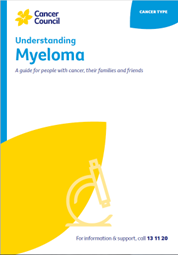Proteasome inhibitors and monoclonal antibodies
Proteasome inhibitors block the breakdown of protein within myeloma cells, causing them to stop growing and die. Commonly used proteasome inhibitors for myeloma include bortezomib and carfilzomib. Other drugs may be accessed in certain circumstances.
Learn more about:
How they are given
Bortezomib is given as an injection under the skin or into a vein. It is often used together with steroids and chemotherapy. Carfilzomib is given intravenously.
Side effects
Bortezomib and carfilzomib may cause fatigue, diarrhoea, nausea, constipation, low blood counts, infections and shingles. If you have unusual bruising or bleeding, pink urine, or nosebleeds, let your doctor know. Also tell them if you take aspirin, ibuprofen or naproxen. Peripheral neuropathy is common with bortezomib but rare with carfilzomib. Carfilzomib may cause high blood pressure or heart problems, or worsen pre-existing heart conditions.
Monoclonal antibodies
Monoclonal antibodies are made in a laboratory but behave like natural antibodies that fight infection and disease. They target cancer cells and interfere with how they grow and survive. Available drugs include daratumumab and elotuzumab (in combination with lenalidomide).
How they are given – Monoclonal antibodies are injected into a vein (intravenously) or under the skin (subcutaneously).
Side effects – As these drugs are often given as an injection, they may cause an allergic reaction. Other possible side effects include a fever, nausea, diarrhoea and low blood pressure.
What is CAR T-cell immunotherapy?
There is a new treatment called CAR (chimeric antigen receptor) T-cell immunotherapy. However, at the time of publication (September 2022), it is not yet generally available for treating myeloma. CAR T-cell immunotherapy may sometimes be available through clinical trials. Talk to your doctor about whether a clinical trial may be an option for you.
How it works – T-cells are part of the immune system and their job is to hunt down and attack abnormal cells in the body. For CAR T-cell immunotherapy, a blood sample is taken and T-cells are extracted from the blood. The T-cells are modified to target myeloma and then injected back into the body where they identify and attack myeloma cells.
Podcast: Making Treatment Decisions
Listen to more episodes from our podcast for people affected by cancer
More resources
Dr Ian Bilmon, Haematologist, Westmead Hospital and The Sydney Adventist Hospital; Martin Boling, Consumer; Catherine Bowley, Myeloma Support Nurse, Myeloma Australia; Dr Samuel Dickson, Radiation Oncologist, Calvary Mater Newcastle; Rachelle Frith, Clinical Nurse Consultant, Haematology, Prince of Wales Hospital; Dr Wojt Janowski, Haematologist, Calvary Mater Newcastle; Yvonne King, 13 11 20 Consultant, Cancer Council NSW.
View the Cancer Council NSW editorial policy.
View all publications or call 13 11 20 for free printed copies.
Need to talk?
Support services
Coping with cancer?
Speak to a health professional or to someone who has been there, or find a support group or forum
Looking for transport, accommodation or home help?
Practical advice and support during and after treatment
Cancer information
Making cancer treatment decisions
Decision-making steps, consent and second opinions
Deciding on specialist care
How to find and choose a surgeon, oncologist or other specialist

